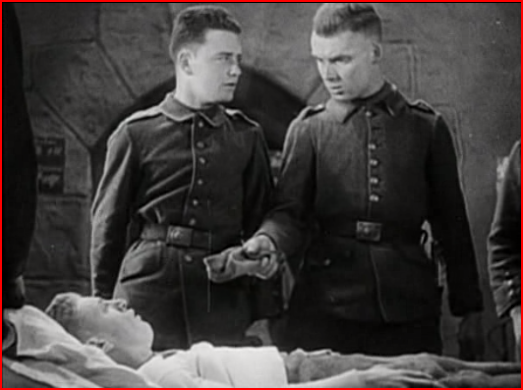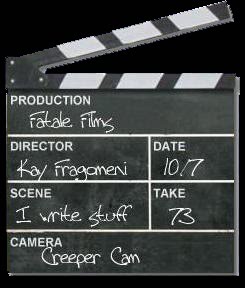Wait, let me rephrase that: Ah, science fiction/fantasy!
It should have been clear from my introduction to this blog (and well, the header at the top of this page) that eventually I would be doing a post on this movie and being that I have been rather lazy lately and haven't updated in a little while, I thought it would be perfect to do this movie now. Because it's only about 9 minutes long. Yep.
So my pre-picture-plot-posting topic for today is about the delicate difference between science fiction and fantasy because I have an English degree which means I can be a real jerk when it comes to using terms correctly. To make things clear: there is a difference and many movies you can think of probably fall under both categories.
To preface this, I just finished watching Inception [2010] with my brother which is a really solid example of a movie that is science fiction but not fantasy. The world of the movie is exactly the same as ours with the one little exception of there being this strange piece of technology that because of its creation has spawned a multitude of jobs, interests, and problems that would otherwise not exist. Take out the dream machine and you have reality as it is now. Anything fantastic happens within the confides of a dream and therefore reality is preserved as being what it establishes itself to be: our world with a dream machine.
On the opposite end of the spectrum would be a movie like any Alice in Wonderland film. The world Alice is in is fantasy but there is nothing bound by reality's established rules of science or any kind of scientific advancement that affects a reality the view is familiar with.
As I said most movies are a combination of both but sometimes it can be hard to tell, particularly if the movie starts out seeming firmly ground in science fiction and then introduces fantasy elements. One such movie I can think of like this is Total Recall [1990]. The movie starts off with the advanced technology one would see in any other science fiction movie and then after Arnold Schwarzenegger arrives on Mars, the movie brings in other life forms.
The one general way to turn sci-fi into sci-fi/fantasy: Just add aliens.
You can even break down common elements of either into categories:
Robots: Science Fiction
Time Travel: Science Fiction
Time Travel via Time Lord: Science Fiction/Fantasy
Another World Like Ours: Fantasy
Space Travel: Science Fiction
Space Travel With Aliens: Science Fiction/Fantasy
Mind Fucking Tech: Science Fiction
Vampires/Werewolves/Mermaids/Etc.: Fantasy
Talking Animals: Fantasy
Alchemy: About 85% Science Fiction and 15% Fantasy (if done right)
One of the only exceptions to this general outline that I can think of is any Michael Bay movie which generally hops over what should be somewhat science fiction and goes straight to fantasy. Although this is not because of any stylistic choice; he just happens to ignore all logical laws of science instantly putting himself in fantasy (stuff is loud in space!).
Anyway, Georges Méliès' A Trip To The Moon (or: Le Voyage dans la lune) was the first science fiction (science fiction/fantasy) film ever made. Supposedly it's about 14 minutes if you watch it at the speed they would have watched it back in 1902. For me it was about 10 minutes.
There are also two different background tracks that I've heard to the movie: one is the expected musical track that you hear with silent movies and the other is that of a narrator over a softer musical track explaining what is going on. At the time, narrators were used over music. Either one is fine and I didn't really find there to be much of a difference between the two but this was obviously in a time before movies that dialogue cards to move plot along so that might affect your personal preference.
Other fun facts about this movie:
* Méliès wanted to profit off the film but copies were made and distributed, leading him to become bankrupt.
* This movie seems to have a some steampunk presence to it which would put it at one of the few steampunk-inspired works that were created in the era itself. (Although 1901-1910 is the Edwardian era, not the Victorian but steampunk generally covers both up until about the 1920s when dieselpunk takes over; it's a rather thin line sometimes, particularly in the 1910s).
* Apparently the movie is supposed to end with the astronomers return to Earth and a parade in their honor but the scene was lost. Apparently, they found the complete version of the film in a BARN in 2002 and it had been entirely hand colored. Supposedly the release is out there but I have yet to actually see it.
This is not the first time I have heard of a missing film turning up many years later. Movies were also not able to be preserved in the way they are now so a lot of films had to be extensively restored. In Japan in 1923 the Great Kanto earthquake destroyed a lot of early Japanese films and people are still finding them in random places (in case you wanted to know that earthquake was a 7.9, less than the recent one at 9.0 but many, many more people died).
* The Smashing Pumpkins' music video for the song "Tonight, Tonight" is based off of this movie and the album art for their album Mellon Collie and the Infinite Sadness also shows strong influence from this film. Although I would not recommend watching the video until the end of my review because it's spoiler-y. Or about as spoiler-y as it can be.

*Also, you can watch this movie in it's entirety on YouTube because it is in the public domain. Considering the quality of my pictures, it would make a lot of sense to do so because you can barely see all the little details that you would see if you actually watch the film.
Anyway, now that we have all that cleared up, on with the show!
And I should warn you, these are going to be the worst looking screenshots I will ever take. It's not me man, it's the 1900s.
Here we see a meeting of
Six of the men volunteer for the mission and take off their incredibly silly hats, collars, and robes and exchange them for more reasonable coats and top hats.
Here we see the ship they intend to use. Remember, the moon landing happened in 1969 a whole 67 years after this movie was made. In that time, the logic behind the shape of the ship is rather similar. It looks like a bullet. Good for shooting through the air. Makes sense.
Remember when I said steampunk? This is what I was thinking of in particular.
I wish I knew more about how the actual sets were colored because there is a lot of detail in there to really play up the fact that is going to be in black and white (which makes me really wonder what the colored version looks like). Look in particular at the man's telescope. That has to be painted to have such a shape contrast. But what is it really?
On launch day the ship is put on top of . . . rooftops? Also, the ground crew is made up of women in revealing sailor suits. That's how you know the director was a straight man.
Here one of the astronomers seems to be attempting to serenade all of the crew on the ledge. Ambitious.
The ship's crew climbs into the bullet ship.
The bullet is then loaded into the launching mechanism. Is it too earlier in the history of film to look for phallic imagery? I mean, skanky salior suits. It's not too big a stretch.
Thanks for illustrating my point further, girls.
The bullet comparison continues as the ship is literally SHOT into space. That operator must have impeccable aim. The French army could use him. Or they could just fight with the sailor suit army and there would be a faster win for the Allies in WWI.
The man in the moon. Literally.
There's a dance scene in Moulin Rouge [2001] that references this film as much as the Smashing Pumpkins video above and this shot reminded me of it.
This is the most famous scene from the movie. All I could think was, "Damn, that ship must be HUGE."
Also, doesn't it look like a large soda can? It's a many decades too early reference to humans leaving their junk all over the moon. *gasp* Méliès was psychic!
Somehow being able to sustain life, the astronomers leave the ship and take an excited look around.
At night (I guess?), they roll out their sleeping bags and curl up under the sky and see a shooting star.
Stars with people's faces in them? Am I the only one who finds this really grotesque?
Apparently from the moon, constellations actually look like the figures they represent.
Moon dust storm?
They travel into an Alice in Wonderland cave and look around. Hopefully they avoid the mushrooms. Those things will probably either kill you instantly or make you trip balls forever.
A moon monster appears!
But apparently the moon monsters are made of nitrogen triiodide or something because a little touch with an umbrella makes them explode.
A slew of moon monsters come after them for killing their friends, tie them up, and bring them to the moon king and his court which looks vaguely Aztec.
Of course, having learned that these things are made of the most unstable compounds ever, they easily kill the king and make an escape with many moon monsters still hot on their heels.
In order to escape, they all crowd into the ship and push it over a ledge.
Somehow the ship lands in the ocean. This part truly doesn't make sense to me. Did they fall back to Earth or are there oceans on the moon?
But apparently that's the end. Of course, we know from the complete version that they make it back and have a parade in their honor but I'm still not sure what to think of this ocean confusion.
Anyway, it's a really interesting film and truly amazing considering it was made in 1902 before any film conventions had been established and before cameras were really being used to tell fictional stories.
Go check it out. If you don't like it, you only lost 10 minutes of your time that you probably would have wasted doing nothing anyway.






































































